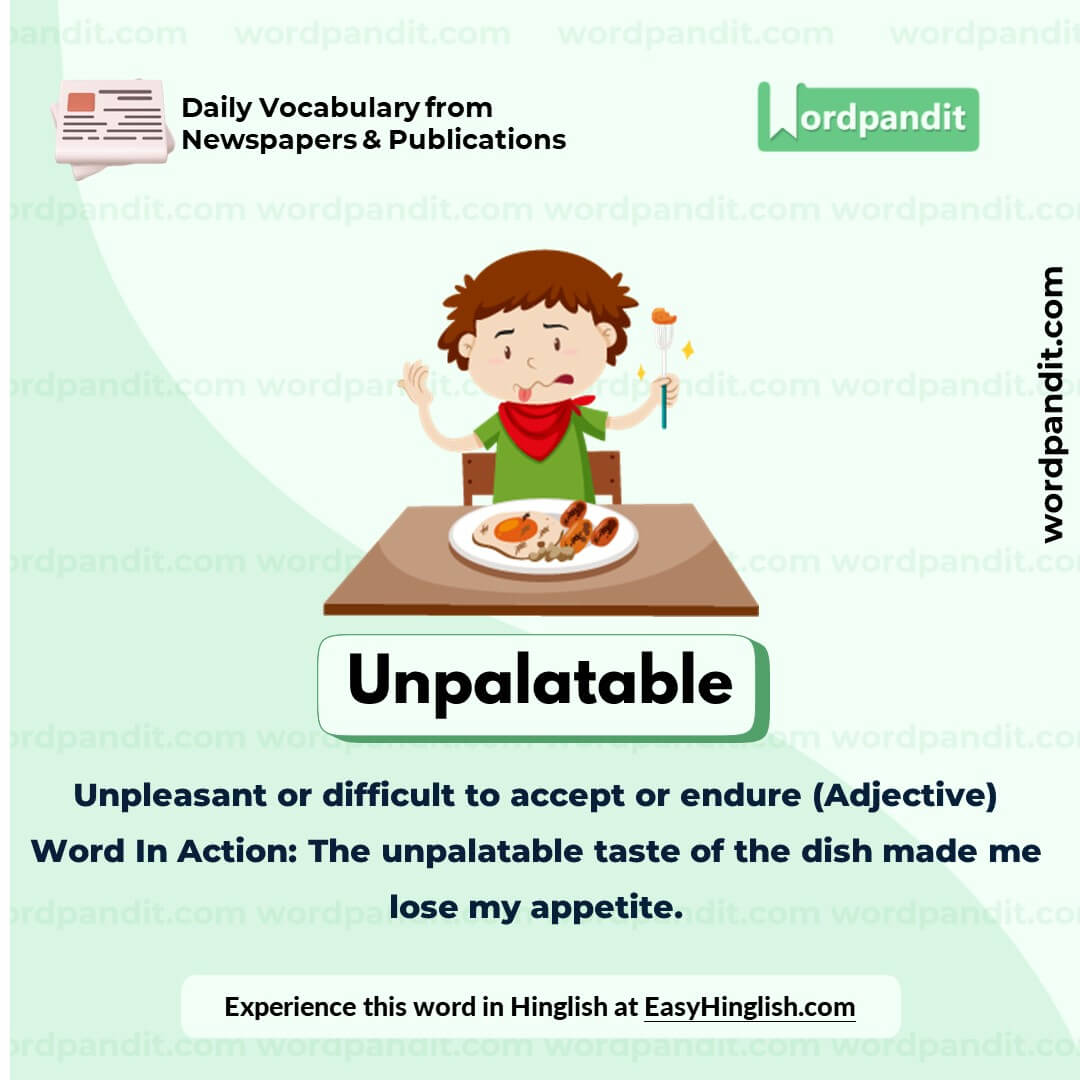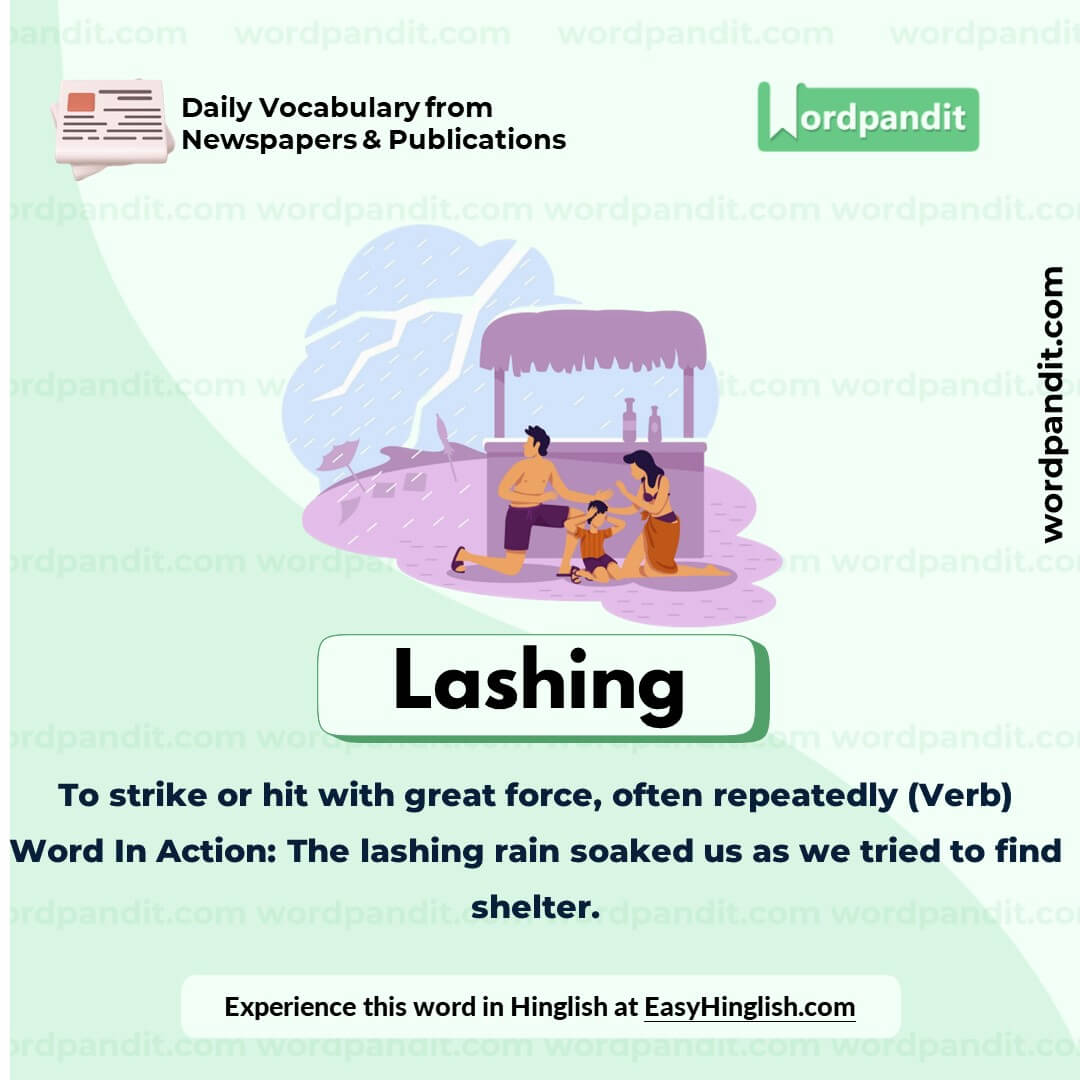Daily Vocabulary from International Newspapers and Publications
Expand Your Vocabulary with Wordpandit’s Global Vocabulary Hub
At Wordpandit, we are committed to helping you develop a truly global vocabulary by drawing from some of the most respected international publications. This section is designed to keep you ahead of the curve by introducing you to words that define global conversations and trends.
The Power of Global Sources
To help you think and communicate on a global scale, we curate vocabulary from renowned international sources, such as:
- The New York Times
- The Washington Post
- BBC
- The Guardian
- The Economist
- Scientific American
- Psychology Today
- And many more...
Stay Global, Stay Competitive
Our daily updates from international publications ensure you are consistently exposed to new words that reflect global news and developments, making sure your vocabulary is not only current but also globally relevant.
Enhance Your Global Perspective
Whether you’re preparing for international exams, aiming to excel in global business communication, or want to enhance your language skills for personal growth, Wordpandit offers the resources you need to thrive in a global context.
Effective Learning, Global Reach
Our learning methodology combines global examples, memory aids, and interactive activities, allowing you to internalize new words effectively and apply them in real-world scenarios.
Begin Your Global Vocabulary Journey Now!
Why Choose Wordpandit?
Practical Learning: Focus on words you'll actually encounter in real-world reading, enhancing your comprehension and communication skills.
Diverse Content: From current affairs to scientific breakthroughs, our varied sources expose you to vocabulary across multiple domains.
Effortless Integration: Make Wordpandit a part of your daily routine. Just a few minutes each day can significantly boost your lexicon over time.
Your Path to Vocabulary Mastery
- Visit our Daily Vocabulary section regularly
- Explore new words and their usage in context
- Practice incorporating these words into your own writing and speech
- Track your progress as your vocabulary expands
Start Your Journey Today
Embark on your vocabulary enhancement journey with Wordpandit. By consistently engaging with our daily posts, you'll build a robust vocabulary that serves you well in academic, professional, and personal contexts.
Remember, a word a day keeps linguistic limitations at bay. Make Wordpandit your daily companion in the quest for vocabulary excellence!
WORD-1: Unpalatable
Context:
"In recent years, has come to seem unpalatable, if not indigestible - knowledge such as English vocabulary beyond that which is in common usage." - BBC
Explanatory Paragraph:
The word "unpalatable" refers to something that is unpleasant, difficult to accept, or hard to tolerate. In this context, it describes knowledge that is hard to digest or embrace, especially when it goes beyond the commonly used vocabulary.
Meaning: Unpleasant or difficult to accept or endure (Adjective)
Pronunciation: un-PA-luh-tuh-bul
Difficulty Level: ⭐⭐⭐ Intermediate
Etymology: From the Latin "un-" (not) and "palatum" (the roof of the mouth), metaphorically meaning "not pleasing to the taste".
Synonyms & Antonyms:
Synonyms: Unpleasant, distasteful, unacceptable, objectionable, disagreeable
Antonyms: Palatable, agreeable, acceptable, pleasant
Usage Examples:
- The new policy was considered unpalatable by many members of the community.
- The bitter truth about the situation was unpalatable to all involved.
- He found the idea of moving to a new city unpalatable, as he had grown so fond of his hometown.
- Although the argument was unpalatable, it needed to be addressed for the sake of progress.
Cultural Reference:
"The unpalatable truth is often more revealing than the comforting lie." - Author Unknown
Think About It:
Why do you think certain truths or ideas are considered unpalatable? How does our tolerance for difficult information vary across cultures?
Quick Activity:
Think of a situation where you had to accept something unpalatable. Write a short paragraph about it and how you handled it. Was it difficult to accept? Why or why not?
Memory Tip:
Think of the word "palate" (as in taste) and remember that "unpalatable" refers to something that is "not pleasing to the taste" — either literally or figuratively.
Real-World Application:
The word "unpalatable" can be used in various contexts, from describing food that tastes bad to discussing ideas, policies, or truths that are hard to accept in personal or social settings.
WORD-2: Lashing
Context:
"It involves two atmospheric disturbances doing an intricate dance — or in this case, two storms taking turns lashing the Northwest while rotating around a central point. And this rare phenomenon is actually happening in two places at once this week: in the Northwest and the Northeast." - The Washington Post
Explanatory Paragraph:
The word "lashing" refers to a forceful, often violent action, especially in the context of weather. It describes strong winds, heavy rain, or other extreme weather phenomena that hit a place with intensity, almost as though they are striking or whipping something. In the given context, "lashing" is used to describe the aggressive nature of the storms that are battering the regions with severe weather conditions.
Meaning: To strike or hit with great force, often repeatedly (Verb)
Pronunciation: /ˈlaSHing/
Difficulty Level: ⭐⭐⭐ Intermediate
Etymology: Derived from the verb "lash," meaning to strike or whip with a quick motion. The word originally referred to the act of whipping or striking with a rope or similar object.
Synonyms & Antonyms:
Synonyms: Striking, whipping, pounding, battering, hitting
Antonyms: Caressing, gently touching, soothing
Usage Examples:
- The strong winds were lashing against the windows, making it difficult to hear anything outside.
- The ship was caught in the storm, with waves lashing against its sides.
- The wind continued lashing the coastline, leaving a trail of destruction in its wake.
- During the summer monsoon, the rain often lashes the area for hours at a time.
Cultural Reference:
"The wind was lashing against the ship's sails, pushing it farther out to sea." - Traditional sea shanty lyrics
Think About It:
How do different cultures use the word "lashing" to describe weather, and what does it tell us about the way people view storms or natural disasters?
Quick Activity:
Think of a recent weather event where "lashing" could be an appropriate description. Write a short sentence describing the scene using the word "lashing." Be sure to emphasize the force and intensity of the event!
Memory Tip:
Imagine a whip cracking in the air. The sharp, sudden motion of the whip can help you remember the meaning of "lashing" — an intense, forceful strike or impact.
Real-World Application:
"Lashing" is commonly used to describe extreme weather events such as storms, hurricanes, or heavy rain, where the force of nature seems to strike repeatedly. It can also be used in non-weather contexts to describe intense physical force, such as when a whip or a rope is used to strike something.
WORD-3: Swiveling
Context:
"The swiveling of the storms resembles a synchronized pair of figure skaters out on a rink, each mirroring the other’s sweeping movements." - The Washington Post
Explanatory Paragraph:
Meaning: To rotate or turn around a fixed point or axis (Verb)
Pronunciation: SWIV-uh-ling
Difficulty Level: ⭐⭐ Intermediate
Etymology: Derived from the Middle English word "swiven," meaning to turn or rotate, possibly influenced by "swivel," a device that allows something to turn around a fixed point.
Synonyms & Antonyms:
Synonyms: Rotating, spinning, turning, twisting, pivoting
Antonyms: Stagnant, still, stationary
Usage Examples:
- The chair was swiveling smoothly, allowing him to easily turn from one desk to another.
- The spotlight was swiveling across the stage, highlighting different performers.
- The storm clouds were swiveling in a tight spiral, intensifying the wind and rain.
- She was swiveling in her chair, lost in thought as she pondered the next steps.
Cultural Reference:
"Like a dancer swiveling on stage, the planet itself moves with an elegance we rarely notice." - Unknown
Think About It:
Why do you think rotating or swiveling motions are often associated with elegance and grace, such as in dance or storms? Can you think of other examples where this motion is visually appealing?
Quick Activity:
Take a few moments to observe a rotating object around you (e.g., a fan, a spinning top). Describe its motion using as many synonyms of "swiveling" as possible.
Memory Tip:
Think of a "swivel chair" — one that allows you to turn easily. This motion is very similar to "swiveling," as it involves rotating around a central point.
Real-World Application:
The concept of "swiveling" can be applied in various fields, from engineering and design (swiveling chairs, cameras, and monitors) to natural phenomena like tornadoes or hurricanes, where the air moves in a rotating, spiraling fashion.
WORD-4: Endorsement
Context:
"And though disclosures must be easy to find, read, and understand and should be placed directly within the endorsement, influencers are creative, designing ambiguous hashtags or burying disclosures to obfuscate their material connections to a brand." - Psychology Today
Explanatory Paragraph:
Meaning: Public support or approval, often used in advertising or promotion (Noun)
Pronunciation: /ɪnˈdɔːrs.mənt/
Difficulty Level: ⭐⭐⭐ Intermediate
Etymology: From Old French "endors" (to support), from Latin "endorsementum," meaning to approve or sign in support of something.
Synonyms & Antonyms:
Synonyms: Approval, support, backing, sanction, promotion
Antonyms: Disapproval, rejection, criticism, opposition
Usage Examples:
- The celebrity's endorsement of the new phone sparked a huge increase in sales.
- The athlete's endorsement deal with the shoe company helped boost their brand visibility.
- Many endorsements in social media are not clearly labeled, misleading consumers about the product's credibility.
- Her endorsement of the charity brought in much-needed donations.
Cultural Reference:
"Endorsement deals are an essential part of celebrity culture today, with stars constantly partnering with brands to promote everything from makeup to automobiles." - Pop Culture Insights
Think About It:
How does the authenticity of an endorsement affect a consumer's trust in a product or service? Do you think all influencers should disclose their financial ties to brands?
Quick Activity:
Find an endorsement from a celebrity or influencer online. Analyze how clearly the endorsement is disclosed. Do you think it follows ethical guidelines?
Memory Tip:
Think of "endorsement" as a stamp of approval. Imagine someone signing a document to show their support or approval of a product or idea, which will help you remember its meaning.
Real-World Application:
Endorsements are commonly used in advertising and marketing strategies. In the context of social media, influencers' endorsements can greatly impact consumer behavior and purchasing decisions, which is why disclosures are important to maintain transparency and trust.
WORD-5: Detained
Context:
"The Vietnamese manager of the Nana Backpackers Hostel where the tourists were staying has been detained for questioning, tourist police told the AFP news agency." - Aljazeera
Explanatory Paragraph:
Meaning: To hold someone in custody or under restraint (Verb)
Pronunciation: dih-TAYND
Difficulty Level: ⭐⭐⭐ Intermediate
Etymology: From the Latin "detinere," meaning to hold back, from "de-" (away) and "tenere" (to hold).
Synonyms & Antonyms:
Synonyms: Held, imprisoned, confined, arrested, captured
Antonyms: Released, freed, liberated, discharged
Usage Examples:
- The suspect was detained by the police for several hours while they investigated the crime scene.
- He was detained at the airport for questioning after officials found discrepancies in his documents.
- The journalist was detained for covering a protest that had turned violent.
- After being detained for a few hours, the manager was released once the authorities cleared up the misunderstanding.
Cultural Reference:
"The concept of being detained without being charged is a controversial issue in many countries, often raising concerns about human rights and the legality of such actions." - Human Rights Watch
Think About It:
What is the difference between being detained and being arrested? In what situations do you think it might be more appropriate to detain someone rather than arrest them?
Quick Activity:
Imagine you are a police officer and need to detain a person for questioning. Write a brief dialogue explaining to the individual why they are being detained and how long they can expect to be held.
Memory Tip:
Think of the word "detain" as "detour" — both involve stopping or diverting temporarily. "Detain" implies holding someone for a short period for further action or investigation.
Real-World Application:
In law enforcement and legal settings, people are often detained for brief periods for questioning or investigation. Detention is also common in border security and immigration situations, where authorities may hold individuals for further inspection.
















